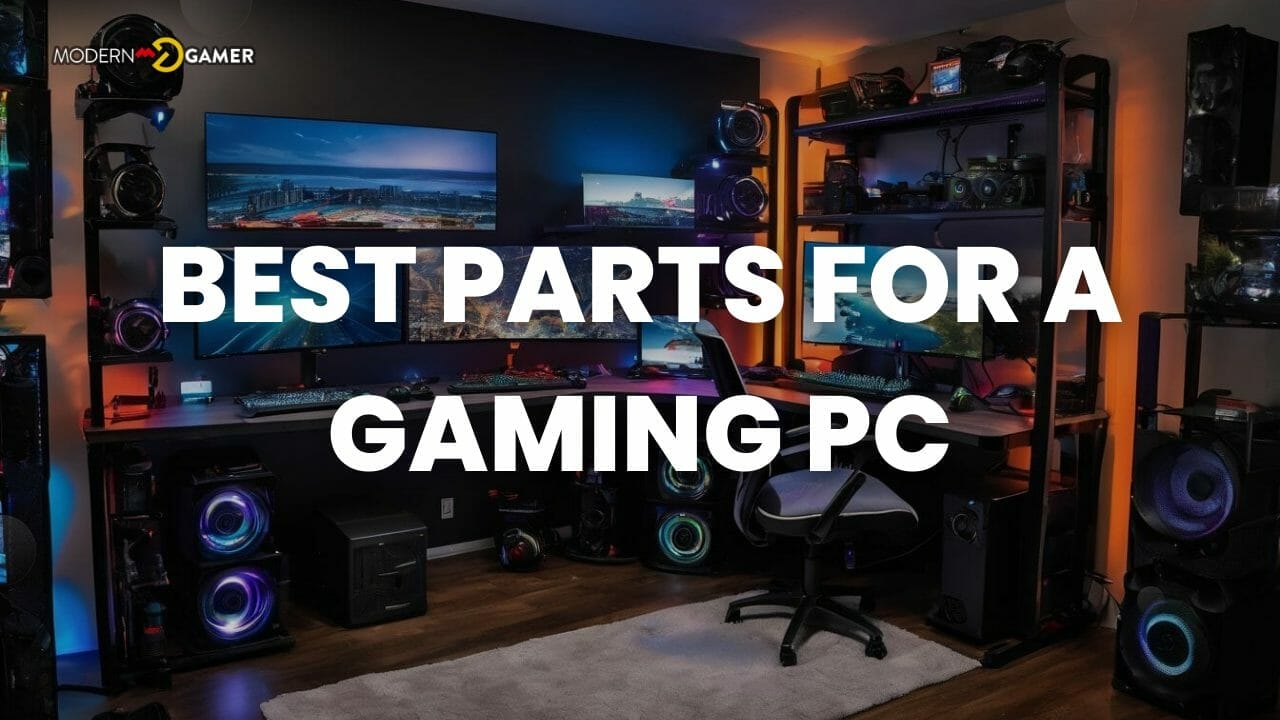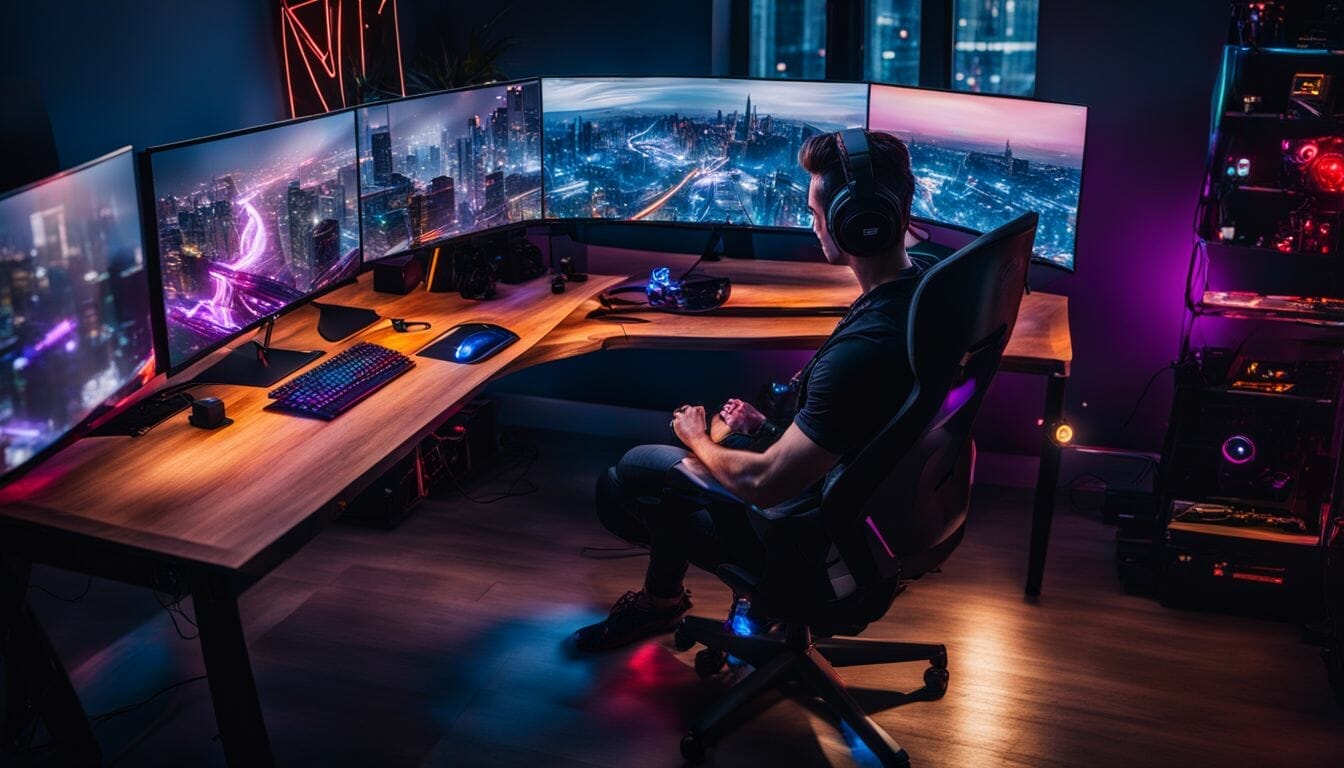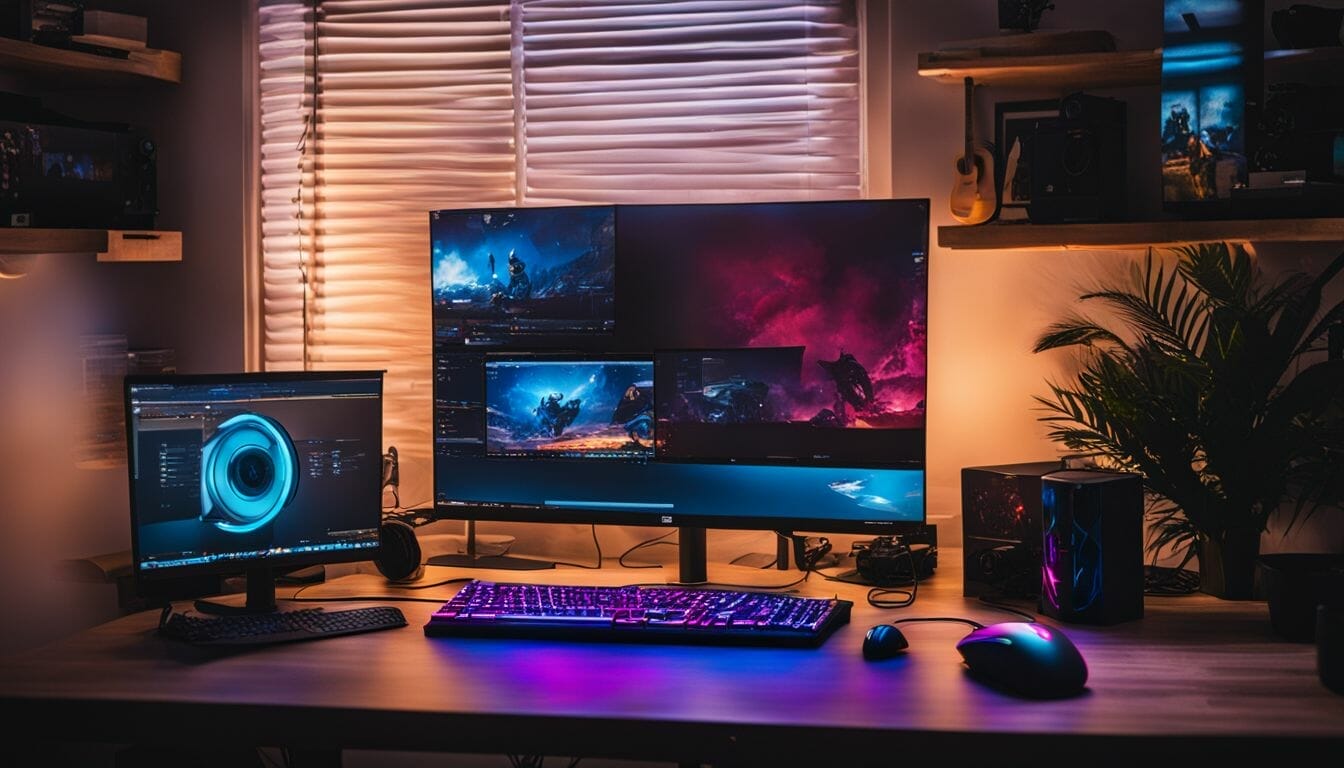Building a Gaming Masterpiece: The Best Parts for a Gaming PC

Building a gaming PC can seem intimidating. We recognize the struggles in sifting through endless options to pick high-quality components for smooth gaming experiences. Our blog delivers straightforward advice on selecting premier components suited for different budget levels and gives essential tips to maximize your investment’s worth.
Gear up – it’s time to make your dream gaming PC a reality!
Key Takeaways
- Building a gaming PC can be overwhelming, but there are options for different budgets. You can build a decent gaming PC under $500 with options like Intel Core i3 or AMD Ryzen 7 CPUs and GTX 1650 or Radeon RX 6500 XT graphics cards.
- A budget of $800 allows you to build a solid mid – level gaming PC that can handle games at 1080p resolution. Consider components like relevant CPUs, appropriate motherboards, suitable graphic cards, advisable RAM, appropriate storage devices, suitable power supply units (PSUs), and cooling systems.
- With a budget of $1,000 or $1,500 or $2,000, you can build powerful gaming PCs with top-tier performance. Optimal CPU choices include Intel Core i5-12400F for the lower budget range and AMD Ryzen 5 7600X for the higher budget range. Research brand models to ensure compatibility with other components.
- Other essential components for your gaming PC include the motherboard that connects all parts together efficiently; graphics card to provide stunning visuals in games; memory (RAM) to speed up computer processes; storage (HDD or SSD) for game saving and faster loading times; and power supply unit (PSU) to convert AC current into regulated power for your computer’s needs.
Best PC Builds for Gaming

In this section, we will explore the best PC builds for gaming across various budgets, including options for those with a sub $500 budget, an $800 budget, a $1,000 budget, a $1,500 budget, and a $2,000 budget.
Sub $500 Budget
We’re often asked if it’s possible to build a decent gaming PC with a budget under $500. The answer is a resounding yes! We’ve put together a couple of builds that provide a solid foundation for future upgrades without sacrificing performance.
| Component | Mid-Tower Build | Micro ATX Build |
|---|---|---|
| CPU | Intel Core i3 | AMD Ryzen 7 |
| Graphics Card | GTX 1650 | Radeon RX 6500 XT |
| Memory | 8GB DDR4 | 8GB DDR4 |
| Storage | 1TB HDD | 500GB SSD |
| Power Supply Unit | 400W | 400W |
| Cooling | Standard Fan | Standard Fan |
These builds represent the best budget gaming PC options for 2023 under $500. They include the best PC components at this price point, offering a great balance between performance and cost. Whether you prefer a larger mid-tower build or a more compact micro ATX setup, these options have you covered for a stellar gaming experience.
$800 Budget
With a budget of $800, one can acquire the core parts required to build a solid mid-level gaming PC. This PC build has a lot of gaming potential and is appropriate for gamers searching for a budget-friendly solution. Not to forget, prebuilt gaming PC options are also readily available for the same budget. Here we have curated a table outlining the best parts for an $800 gaming PC build.
| Component | Product | Approx. Price |
|---|---|---|
| CPU | (Relevant CPU with pricing within the $800 budget) | Product Price |
| Motherboard | (Appropriate Motherboard within budget) | Product Price |
| Graphics Card | (Suitable Graphics Card for budget) | Product Price |
| Memory (RAM) | (Advisable RAM within budget) | Product Price |
| Storage | (Appropriate Storage Device within budget) | Product Price |
| Power Supply Unit | (Suitable PSU within budget) | Product Price |
| Cooling System | (Appropriate Cooling System within budget) | Product Price |
This build is capable of running games on a 1440P monitor and can easily handle games at 1080P resolution. Furthermore, the best parts for a gaming PC have been included in the above table, keeping the affordability and gaming performance in mind. For more elucidation or specific recommendations on an $800 gaming PC build, we suggest some related search queries.
$1,000 Budget
Building a gaming PC with a budget of $1,000 allows for top-tier performance and lays a strong foundation for the future of your PC gaming. The components recommended for a $1,000 gaming PC build include an Intel Core i5-12400F processor, ASUS Prime H610M-E D4 motherboard, and MSI GeForce RTX™ 4060 VENTUS 2X BLACK 8G OC graphics card. These choices are based on both performance and quality to provide the best value for the price.
In addition to these, for your build we suggest the Phanteks Eclipse P300A case, Corsair CX750M power supply, and a CPU cooler that comes with the processor. These components have been carefully chosen and tested by our team of PC experts to ensure a smooth and enjoyable gaming experience.
The table below outlines the components and their costs:
| Component | Model | Price |
|---|---|---|
| CPU | Intel Core i5-12400F | $150 |
| Motherboard | ASUS Prime H610M-E D4 | $70 |
| Graphics Card | MSI GeForce RTX™ 4060 VENTUS 2X BLACK 8G OC | $500 |
| Case | Phanteks Eclipse P300A | $60 |
| Power Supply | Corsair CX750M | $80 |
| CPU Cooler | Comes with the processor | Included |
| RAM | Corsair Vengeance LPX 16GB | $60 |
| Storage | Western Digital Blue 1TB SSD | $80 |
This setup will be put to the test in a range of scenarios to ensure its performance is up to par, even for the most demanding games.
$1,500 Budget
For a gaming PC with a $1,500 budget, we recommend the AMD Ryzen 5 7600X as the CPU. It offers excellent gaming performance without breaking the bank. To keep your CPU cool, we suggest using the Noctua NH-U12S Redux cooler. It’s efficient and reliable.
When it comes to the motherboard, go for the MSI PRO B650-P WiFi ProSeries. It provides great compatibility and features for your build. As for power supply, a 550 Watt PSU should be sufficient for this setup and gives you room to overclock if desired.
Remember to allocate your budget wisely across other components like graphics card, memory, storage etc., so you can maximize your gaming experience. The guide also includes benchmarks and gaming performance information to help you make informed decisions while building your PC.
$2,000 Budget
For those with a $2,000 budget, you have some great options for building a powerful gaming PC. With this budget, you can get top-notch components that will deliver an excellent gaming experience. When it comes to prebuilt options, the Skytech Gaming Shiva 2 and Corsair Vengeance are highly recommended for 1440p gaming. These PCs offer great value for the price and will handle demanding games with ease. If you prefer to build your own PC, there are plenty of choices available within your budget range. Whether you prioritize high frame rates or stunning graphics, you can find the perfect combination of CPU, motherboard, graphics card, memory, storage, power supply unit (PSU), and cooling solutions to suit your needs. So get ready to immerse yourself in exciting gaming sessions with a $2k gaming PC!
Essential Gaming PC Components

Now let’s dive into the essential components you’ll need for your gaming PC.
CPU
The CPU, or central processing unit, is the most important component of a gaming PC. It’s like the brain of your computer, determining its performance level and compatibility with next-gen components.
The CPU handles all of the computer’s operations, so having a powerful processor is crucial for a seamless gaming experience. When selecting a CPU, you have numerous options available to find one that suits your needs and budget.
By considering factors like clock speed, number of cores, and cache size, you can ensure that your gaming PC has the processing power it needs to deliver an exceptional gaming performance.
Motherboard
The motherboard is an important hardware component that connects and links all the main parts of a gaming PC. It’s like the main circuit board that helps everything work together. Think of it as a communication link between all the other components, like the CPU, graphics card, memory, storage, and more.
The motherboard plays a big role in how well your gaming PC performs. It’s also crucial to make sure that the voltage and compatibility of your motherboard match with your other components when building your custom rig.
So, if you want a powerful and efficient gaming experience, don’t forget about choosing a good motherboard!
Graphics Card
The graphics card is the most important component of any gaming computer. It’s what makes those high-quality graphics possible in PC games. The graphics processing unit (GPU) in the card performs complex calculations to render images and videos.
It works alongside the CPU to deliver smooth gaming performance. When choosing a graphics card, look for one with at least 4GB of video RAM (VRAM) for 1080p gaming, but if you want the best experience, go for a card with 6GB of VRAM.
So, when building your gaming PC, make sure to invest in a good graphics card to enjoy stunning visuals and smooth gameplay.
Memory
RAM, or memory, is an important part of a gaming PC. It’s like the computer’s short-term memory that stores information that needs to be quickly accessed. More RAM means a faster computer because it provides resources for the processor and graphics card.
So when building a custom gaming rig, make sure to include enough memory to handle all those intense gaming sessions. It’s one of the essential components needed to boost your gaming performance and overall system speed.
Storage
Storage is an important part of any gaming PC. It’s where you save your games and all the game-related files like videos and screenshots. When choosing storage for your gaming rig, you have two main options: a hard drive (HDD) or a solid-state drive (SSD).
HDDs are more affordable and offer larger storage capacity, which is great for gamers who have tons of games and media files. On the other hand, SSDs are faster when it comes to read and write speeds.
This means that your games will load quicker, reducing those annoying loading screens.
When building a custom gaming PC, make sure to consider the compatibility of your chosen storage with the motherboard. You don’t want to end up with components that won’t work together! So, before purchasing a HDD or SSD, double-check its compatibility with your motherboard.
Power Supply Unit
The power supply unit (PSU) is a vital component in any gaming PC. It converts AC current from a wall outlet into the lower AC and DC currents needed for your computer to function properly.
Think of it as the energy source that keeps everything running smoothly. When choosing a power supply, it’s important to consider your gaming PC’s power requirements. The more components you have, like the CPU, GPU, RAM, and storage options, the more power you’ll need.
So make sure to give as much attention to selecting the right PSU as you do to other parts of your gaming PC setup. By choosing a power supply that aligns with your needs, you can not only ensure proper functionality but also potentially lower costs and improve efficiency.
Power supplies are often overlooked when building a gaming PC because they don’t get as much attention as flashy graphics cards or speedy processors. However, without a reliable and efficient PSU, all those high-performance components won’t be able to reach their full potential.
That’s why it’s crucial to choose a power supply that meets both your energy requirements and budget constraints.
Cooling
Cooling is essential for gaming PCs because heat can damage computer hardware. To keep components running smoothly, it’s important to manage temperatures effectively. Graphics card cooling solutions are often pre-installed and consist of fans surrounding the graphics processor.
One basic and affordable method of cooling is air cooling, which uses heatsinks and fans. Another option is liquid cooling, which offers better performance and quieter operation. During intense gaming sessions that generate a lot of heat, proper cooling is crucial to prevent overheating.
If components get too hot, it can lead to performance issues, instability, and even damage. So make sure your gaming PC has good cooling solutions in place to ensure stability and longevity for all your hardware components.
Tips for Finding Discounts on PC Components
We’ll share some expert tips on finding discounts to help you save money on your gaming PC build. Read on to discover how to get the best deals and stretch your budget even further.
Researching sales and deals
When looking to save money on PC components, researching sales and deals is a great strategy. Keep an eye out for discounts on websites and in stores, as they can often offer significant savings.
It’s also worth checking for refurbished options, as these can provide high-quality components at lower prices. Another tip is to utilize online coupon codes when making your purchases.
These codes can help you get additional discounts or free shipping on your orders. By taking the time to research sales and deals, you can find affordable gaming PC components without sacrificing quality or performance.
Checking for refurbished options
If you’re looking to save some money on your gaming PC components, checking for refurbished options is a smart move. Refurbished products are secondhand items that have been restored to working condition.
They are often discounted and can be a great way to get high-quality components at a lower price. Just keep in mind that refurbished products may not come with all the accessories included in new-product purchases.
It’s also important to check the warranty and return policy before buying refurbished PCs. To ensure you’re getting a reliable product, look for reputable companies known for their dependability and quality when purchasing refurbished gaming PCs.
Utilizing online coupon codes
We all love saving money, especially when it comes to buying computer components for our gaming PCs. One great way to find discounts on PC parts is by utilizing online coupon codes.
These codes can help you save a significant amount of money on your purchases. Did you know that over 90% of shoppers actively search for and use coupon codes while shopping online? It’s true! So why not join the savvy shoppers and take advantage of these savings opportunities? There are many ways to find coupon codes, such as researching sales and deals, checking for refurbished options, and using coupon websites like RetailMeNot.
Don’t miss out on the chance to save some serious cash when building your dream gaming PC!
Conclusion
In conclusion, when it comes to building a gaming PC, the CPU and graphics card are essential for top-notch performance. Don’t forget about the motherboard and power supply unit (PSU) for stability.
Storage options like SSDs and HDDs, along with ample RAM and proper cooling solutions, can enhance your gaming experience. Consider peripherals like a gaming keyboard, mouse, and monitor to complete your setup.
And remember to research different brands and models to find the best value for your budget or consider prebuilt options for simplicity. Happy gaming!
FAQs
1. What are the essential parts needed for a gaming PC?
The essential parts needed for a gaming PC include a processor, graphics card, memory (RAM), storage device (hard drive or SSD), power supply, and motherboard.
2. How much RAM do I need for a gaming PC?
For most modern games, 8GB to 16GB of RAM is sufficient. However, if you plan to multitask or play more demanding games, 16GB to 32GB would be recommended.
3. Which graphics card is best for gaming?
The best graphics card for gaming depends on your budget and desired performance level. Popular options include NVIDIA GeForce RTX series and AMD Radeon RX series.
4. Do I need an expensive processor for gaming?
While having a powerful processor can improve overall performance, it doesn’t necessarily have to be the most expensive one available. Look for processors with good speed and multiple cores within your budget range.
5. Should I prioritize investing in a better graphics card or processor?
If you primarily use your computer for gaming, investing in a better graphics card will have a bigger impact on game performance than upgrading the processor alone.

